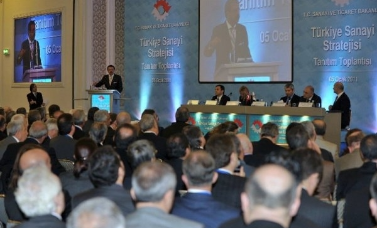
Industrial Strategy Paper of Turkey announced
"Industrial Strategy Paper of Turkey and Action Plan, 2011-2014", which has been prepared by the Ministry of Industry and Trade and included among the closing criteria for the EU chapter on "enterprise and industrial policy" as part of the EU accession negotiations, was made public at a meeting held at the Çırağan Hotel in early January 2011. Turkey's new industrial strategy that is based on analysis of developments in the world, EU and Turkey and designed with a participatory approach will contribute to navigate and support the structural transformation that will enhance the competitive strength of the industry and sectors in line with pre-determined long term vision, general objectives and strategic targets.
The industrial strategy is in compliance with the EU's approach towards industrial policy and introduces a framework policy designed on the basis of a SWOT (Strengths, Weaknesses, Opportunities and Threats) analysis of the Turkish industry. The vision of the industrial strategy is determined as "to become the production base of Eurasia for mid- and high-technology products." According to the paper:
- Procedures for company establishment and workplace opening will be easier.
- Income tax system will be re-arranged.
- SMEs (Small- and Medium-sized Enterprises) will be supported so that their production and export capacity is increased.
- In order to realize a sustainable increase in export volume, innovative ideas as well as production and marketing processes of branded products and services based on R&D activities and with high added value will be supported.
- R&D activities performed by the private sector and public sector will be boosted.
- Activities will be performed in order to ensure products based on alternative energy sources are used in the industry, their technical infrastructure is improved and their commercialization is made successfully.
The launch event of the strategy paper was attended by Nihat Ergün, Minister of Industry and Trade, Rifat Hisarcıklıoğlu, Chairman of Union of Chamber and Commodity Exchanges (TOBB), Ümit Boyner, Chairman of Turkish Industrialists and Businessmen’s Association (TÜSİAD), Ömer Cihad Vardan, Chairman of the Independent Industrialists and Businessmen's Association (MÜSİAD), Mehmet Büyükekşi, Chairman of the Turkish Exporters Assembly (TİM) and Rızanur Meral, Chairman of the Confederation of Businessmen and Industrialists of Turkey (TUSKON) as well as a number of industrialists.
The Strategy Paper made public at the meeting contains a framework for defining horizontal industrial policy areas, operating markets effectively and improving investment and business environments to make them attractive for companies. In this context, horizontal policies will be implemented that will influence the competitive strength of all firms, underline the importance of coordination between different organizations, improve the quality of the labor force, make access to financing easier, enhance the innovation capacity, reduce the input costs and increase environmental sensitivity.
In the scope of industrial policies the competitive strength of different sectors is aimed to be boosted by making improvements in areas such as "information and technology", "competition", "legal regulations", "environment and energy", "competitiveness in overseas and commerce" and "employment and geographical dimension". The industrial strategy will be implemented, followed up and evaluated under the coordination of the Ministry of Industry and Trade and in cooperation with the public and private sector.
The paper evaluates the current state of the Turkish economy taking into account external conjuncture and explains the industry vision of Turkey determined as a result of the contributions of all related stakeholders under the leadership of the Ministry of Industry and Trade. Indicating the main components of the strategy, the paper deals with fundamental and horizontal industrial policy areas. The paper also examines industrial policy areas on the basis of sectors and analyses implementation, follow-up and coordination mechanisms.
Seven main sectors under scrutiny
In the scope of industrial policy by sectors, automotive, machinery, white goods, electronics, textile and ready-to-wear, food and iron-steel sectors were defined as main industries.
Accordingly, tax legislation and tax rates applicable to the automotive sector will be made compatible with those of EU in the coming period, in addition to reviewing arrangements for project and R&D incentives according to needs of the sector. Besides, resolution of such foreign trade issues as import of second-hand cars and common customs tariff is adopted as a requirement of the primary policy.
In the machinery sector policies will be implemented that enhance the design capacity of the sector, improve models for decreasing financing costs and create a common procurement system.
In order to boost the competitive strength of the white goods sector, the industrial policy aims to ensure product quality is enhanced, new products are designed with R&D techniques, models for decreasing financing costs are developed and energy-efficient and cost-efficient products are designed.
The effort to be made for the textile industry will focus on encouraging the shift of intense activities from the western parts of Turkey to the east and promoting Istanbul and İzmir as the design, fashion and financing center for textile and ready-to-wear firms spread around Turkey.
As regards the food sector the policy will focus on improving the innovation capacities of firms, implementing an effective monitoring to boost food safety, preparing plans for modernization of agricultural and food enterprises and improvement of hygiene conditions, reducing unrecorded activities and changing agricultural support policies in order to decrease costs for boosting competitiveness in foreign markets.
As regards the electronics sector, the adaptation of new technologies and expansion of their implementation areas, development of new materials, review of the corporate financial infrastructure that affects the sector and development of products to meet the increasing consumer demand for quality have stood out as important policy items.
The industrial policy have stressed that the iron-steel industry is in an advantageous position in terms of labor cost; however, there are deficiencies in relation to energy and input costs.





